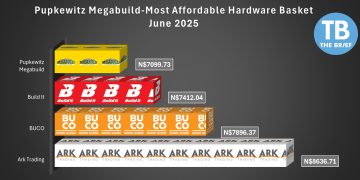
When Aliko Dangote, Africa’s richest person, decided to construct a refinery in southern Nigeria on a plot of swampland almost half the size of Manhattan, he turned to a man who’s helped him transform a small trading company into an industrial empire spanning the continent.
For 30 years, Devakumar Edwin has navigated some of the world’s most difficult business environments to build Dangote’s textile factories, flour mills, food plants and cement firms. Now he is overseeing its biggest project yet: a $20.5 billion oil refinery and fertilizer complex.
The investment is so loaded with superlatives that Edwin reels them off like a shopping list: the biggest crude refinery of its kind in the world; the world’s third-largest fertilizer maker and second-biggest producer of urea; the largest investment ever made in Nigeria; a pair of plants so huge in scope he had to create one of the world’s largest construction companies to develop them.
For Dangote it provides the possibility of dominating the refined-petroleum-products sector the way he has cement and sugar, two markets he effectively controls — with the help of friendly government policy — in Africa’s biggest economy.
Drive some three hours east through the traffic-snarled streets of Lagos, Africa’s largest city, and you reach the entrance to the complex, where the skyline becomes a maze of cranes and pipes, fuel-storage tanks the size of city blocks, and steel columns the height of high-rise buildings. Set atop nearly 10 square miles of land, the petrochemical complex is shrouded by a hazy mixture of dust kicked up by hundreds of construction vehicles crisscrossing the site and the humid equatorial air on Nigeria’s coast.
The venture is Dangote’s most audacious attempt to profit from the monumental inefficiency of Africa’s largest oil producer.
Mismanagement, under-investment, dilapidated or non-existent infrastructure, violence, endemic corruption and theft of an almost unfathomable magnitude have left Nigeria with an entirely broken business model.
While oil and gas sales typically account for about 90% of Nigeria’s export earnings, the state receives a relatively modest sum from the trade – less than $8 billion in 2020, according to the country’s Budget Office. The government’s potential benefits from the industry are further eroded by rampant crude theft – as much as 150,000 barrels per day, according to the government, which is about $5.5 billion a year at current prices. Because Nigeria lacks refining capacity, the state energy company swaps crude – about a quarter of the country’s entire output last year – for imported gasoline, which it then subsidizes so that pump prices are among the lowest in the world – about 40 cents a liter.
The government expects to spend $9.6 billion on gasoline subsidies this year — more than double the amount it spends on education, health and defense combined, government data show. The payment imposes “a massive and unsustainable burden” on government finances, the World Bank said in a report in November.
The government knows how important Dangote’s refinery is to its fortunes — and the billionaire knows how crucial being on the government’s good side is for his own.
Last August, the national oil company took a 20% stake in the refinery project for US$2.7 billion. For Abuja, it means a seat at the table running the refinery and a steady flow of foreign exchange in the form of dividends, said Tajudeen Ibrahim, head of research at the boutique Lagos investment bank Chapel Hill Denham. The government taking a stake was all but inevitable given its strategic importance, Ibrahim said. And Dangote, who’s worth $20.2 billion, knows how big business works in Nigeria.
“When you’re in sync with the government, you make significant progress in your business in this country,” Ibrahim said. “Dangote knows how to ensure his businesses are in sync with the government objectives.”
The billionaire has long denied claims that he uses close government ties to bolster his business. Yet he will be the major beneficiary of provisions in Nigeria’s recently passed Petroleum Industry Act that restrict the license to import refined products for the purpose of covering any shortfalls in local supply to companies with active local refining capacity, said Ayodele Oni, partner at Bloomfield Law Practice in Lagos.
Dangote has a lot riding on the refinery, which was financed by retained profit from Dangote Group’s other businesses, and supplemented by a US$3.3 billion syndicated-bank loan arranged by Standard Chartered Plc.
Before building the sprawling complex, Edwin had to construct roads, a port and two power plants, more than doubling costs from the initial $8 billion estimate and delaying its completion by six years. He spent two years and $300 million pumping 65 million cubic meters of sand onto the project site to raise its altitude by 1.5 meters, shoring up the investment against a potential future rise in sea levels caused by global warming. Observers have also attributed the delays to Dangote acting as its own engineering, procurement and construction contractor, taking on responsibility usually delegated to the likes of Saipem SpA or KBR Inc., in building a facility far more complex than a cement plant.-moneyweb













